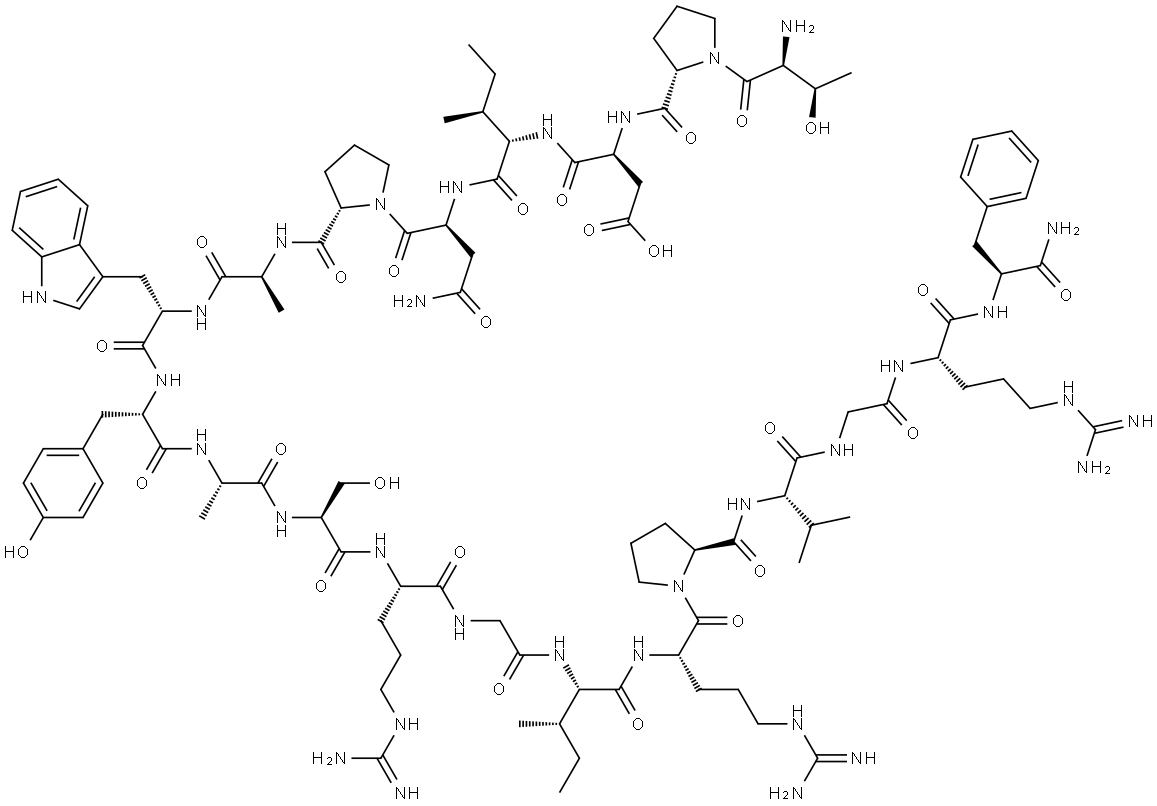235433-36-0
 235433-36-0 結(jié)構(gòu)式
235433-36-0 結(jié)構(gòu)式
基本信息
12-31-人催乳素釋放肽
PROLACTIN-RELEASING肽(1-31) (人)
PRRP31
PRRP20 (HUMAN)
PRRP31 (HUMAN)
TPDINPAWYASRGIRPVGRF-NH2
PREPROLACTIN (23-53) (HUMAN)
PREPROLACTIN (34-53) (HUMAN)
PROLACTIN-RELEASING PEPTIDE (1-31)
SRTHRHSMEIRTPDINPAWYASRGIRPVGRF-NH2
PROLACTIN-RELEASING PEPTIDE (HUMAN)
| 報價日期 | 產(chǎn)品編號 | 產(chǎn)品名稱 | CAS號 | 包裝 | 價格 |
| 2024/11/08 | HY-P1530 | THR-PRO-ASP-ILE-ASN-PRO-ALA-TRP-TYR-ALA-SER-ARG-GLY-ILE-ARG-PRO-VAL-GLY-ARG-PHE-NH2 Prolactin Releasing Peptide (12-31), human | 235433-36-0 | 500μg | 1800元 |
| 2024/11/08 | HY-P1530 | THR-PRO-ASP-ILE-ASN-PRO-ALA-TRP-TYR-ALA-SER-ARG-GLY-ILE-ARG-PRO-VAL-GLY-ARG-PHE-NH2 Prolactin Releasing Peptide (12-31), human | 235433-36-0 | 1mg | 3120元 |
| 2024/11/08 | HY-P1520 | THR-PRO-ASP-ILE-ASN-PRO-ALA-TRP-TYR-ALA-SER-ARG-GLY-ILE-ARG-PRO-VAL-GLY-ARG-PHE-NH2 Prolactin Releasing Peptide (1-31), human | 235433-36-0 | 500μg | 2200元 |
常見問題列表
GPR10
The Prolactin Releasing Peptide (PrRP) is a C-terminally amidated, 31-amino acid peptide derived from a 98-amino acid precursor. Radioiodinated PrRP-(1-31) binds to its receptor with high affinity (1 nM) and stimulates calcium mobilization in CHOK1 cells stably transfected with the receptor. A series of N-terminal deletions reveals that the Prolactin Releasing Peptide (12-31) amino acid is equipotent to PrRP-(1-31). Further N-terminal deletions reduce the affinity of the ligand considerably. Prolactin Releasing Peptide (PrRP) has been identified as a specific, high affinity endogenous ligand for GPR10. Prolactin Releasing Peptide (PrRP) preproprotein can be cleaved at two different positions to give rise to two forms of 31 or 20 amino acids; Prolactin Releasing Peptide (PrRP)-31 and Prolactin Releasing Peptide (PrRP)-20 respectively. Rat Prolactin Releasing Peptide (PrRP) has also been identified and occurs as 31 or 20 amino acid forms; these peptides are highly conserved between species. Human PrRP‐20, human PrRP‐31, rat PrRP‐20 and rat PrRP‐31 display high affinity for GPR10 receptors, with K i values of 0.26±0.07, 1.03±0.41, 0.22±0.06 and 0.33±0.11 nM, respectively.
Following intracerebroventricular injection of Prolactin Releasing Peptide (1-31), human 5 nM there is a highly significant simulation of plasma LH that began at 10 minutes and is maintained over the course of the experiment. Plasma FSH increased at 20 minutes following ICV injection. Total plasma testosterone increased at 60 minutes post injection.